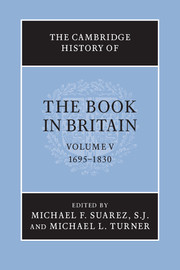Book contents
- Frontmatter
- Introduction
- PART I THE QUANTITY AND NATURE OF PRINTED MATTER
- PART II ECONOMIC, LEGAL AND CULTURAL CONTEXTS
- PART III THE TECHNOLOGIES AND AESTHETICS OF BOOK PRODUCTION
- PART IV THE BOOK TRADE AND ITS MARKETS
- I LONDON AND THE ‘COUNTRY’
- II TWO CASE STUDIES
- III SERIAL PUBLICATION AND THE TRADE
- 20 London newspapers
- 21 Newspapers and the sale of books in the provinces
- 22 British commercial and financial journalism before 1800
- 23 Distribution – the case of William Tayler
- 24 Periodicals and the trade, 1695–1780
- 25 Periodicals and serial publications, 1780–1830
- IV THE INTERNATIONAL MARKET
- V BOOKS AND THEIR READERS
- Abbreviations used in bibliography
- Bibliography
- Index
- Frontispiece
- Plate section
- References
24 - Periodicals and the trade, 1695–1780
from III - SERIAL PUBLICATION AND THE TRADE
Published online by Cambridge University Press: 28 September 2010
- Frontmatter
- Introduction
- PART I THE QUANTITY AND NATURE OF PRINTED MATTER
- PART II ECONOMIC, LEGAL AND CULTURAL CONTEXTS
- PART III THE TECHNOLOGIES AND AESTHETICS OF BOOK PRODUCTION
- PART IV THE BOOK TRADE AND ITS MARKETS
- I LONDON AND THE ‘COUNTRY’
- II TWO CASE STUDIES
- III SERIAL PUBLICATION AND THE TRADE
- 20 London newspapers
- 21 Newspapers and the sale of books in the provinces
- 22 British commercial and financial journalism before 1800
- 23 Distribution – the case of William Tayler
- 24 Periodicals and the trade, 1695–1780
- 25 Periodicals and serial publications, 1780–1830
- IV THE INTERNATIONAL MARKET
- V BOOKS AND THEIR READERS
- Abbreviations used in bibliography
- Bibliography
- Index
- Frontispiece
- Plate section
- References
Summary
Introduction
Distinguishing between eighteenth-century ‘newspapers’ and ‘periodicals’ has been a thorny problem for modern scholars. Unlike modern newspapers, magazines and journals, whose physical appearance easily distinguishes them, many eighteenth-century newspapers and periodicals were published on the same size sheets and the same cheap paper. A further complication arises from the tendency of eighteenth-century publishers to experiment with format and subject matter, hoping to hit upon the happy formula to sustain a regular readership. Ultimately, the only reliable rule of thumb for differentiating them derives from the nature of their predominant content (though, of course, there was some overlap). Newspapers primarily comprised ephemeral material, today’s news being superseded by tomorrow’s news; periodicals, on the other hand, were principally composed of more enduring content – essays, poetry, biographies, literary criticism, book and drama reviews, etc. The clearest evidence that eighteenth-century readers made similar assumptions derives from the practice of contemporary publishers, who collected, bound and offered for sale copies of past periodical issues on an annual or semi-annual basis; the fate of newspapers, however, depended upon the industry of private collectors like Charles Burney.
Keywords
- Type
- Chapter
- Information
- The Cambridge History of the Book in Britain , pp. 479 - 497Publisher: Cambridge University PressPrint publication year: 2009
References
- 2
- Cited by

